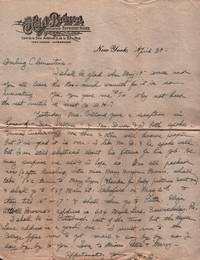first edition One Volume. "Arithmetic Book." Brewer, Joseph (Newton). [Maryland]: June 17, 1786 - (April 21,1789, or after). Folio, half calf
1787 · Maryland
by [History of Science and Mathematics - Children's History] Brewer, Joseph
Maryland, 1787. One Volume. "Arithmetic Book." Brewer, Joseph (Newton). [Maryland]: June 17, 1786 - (April 21,1789, or after). Folio, half calf bdg, contemporary or old boards; scuffed and chipped and bumped, later rebacking. 80 folio sheets (of which 15 blank) with seated Brittania watermarks. 135 pages mss text in brown ink, original manuscript pagination recto-verso, sgd and dated on front pastedown; internally toned, some closed tears. Near Fine. This manuscript journal comprises an 18th-century American student's mathematics course from 1786 - 1789. The author, Joseph Brewer, signs and dates the journal on the front pastedown, but he never mentions
(truncated) his hometown or his parentage. It is only in the last exercises of 1789 that he reveals himself more fully as "Joseph Newton Brewer," and further, firmer internal evidence regarding this identity is wanting. However, inasmuch as he was ostensibly a student in his mid-teens at the time of composition, and makes frequent reference to Maryland in numerous exercises in his book, it is likely that he was Joseph Nathaniel Newton Brewer (January 10, 1771 - January 8, 1841) of Edgewater, Anne Arundel, MD. Marriage and birth certificates found among online genealogical corpora do corroborate this.
Joseph Brewer's "Arithmetic Book" is noteworthy among other extant 18th-century curricular manuscripts, because it showcases a variety of word problems, all of which relate explicitly to period themes. There are expected school subjects such as fractions and decimals, and practice tables, but most of Brewer's assignments are more practical in scope. They treat topics of an especially economic, even mercantile, nature, including problems of currency conversion; partnership, exchange, and barter; loss and gain; legacies and wills; land and surveying.
The commodities Brewer emphasizes his math exercises are also of interest, as they
emphasize in most instances prestige goods and other expensive imports e.g. beer, rum,
chocolate, gold dust, coffee, and tobacco. He writes, in one example, "Three merchants A. B. & C. freight a ship with 248 tons of wine," before extreme weather causes them to throw much of it overboard, necessitating calculations. In another, three men spend a guinea at a tavern, each consuming varied amounts. The persons described in the word problems are also worthy of further study, as in one case where various farm personnel are featured: "one man, three women, and one boy made a crop of 1700 pounds of tobacco...." (p14). Brewer's journal also contains several practice exercises in letter-writing, as to foreign traders (p93). The author of the "Arithmetic Book" seems to have enjoyed this work, and there are many whimsical flourishes in his handwriting (and a few occasional doodles). Most surprising however, is Brewer's decision to conclude his journal with a composite psalmic coda:
"Oh God, who didst command the light to shine out of darkness / speak but the word and light shall dart into my soul at once / when thou my lips, and my mouth shall show forth my / praise shall burst out into a chearful [sic] song"
Overall an interesting relic of education during the years following the Revolution, which should be of interest to scholars of early American education due to its detail and thematic content.
(Inventory #: List2432)







![Exodus Is An Illumination Theatre of Madness An Laughter Poetry and Thieves to Steal Your Soul [Flyer for a Berkeley Performance by the San Francisco Mime Troupe and Others]](https://d3525k1ryd2155.cloudfront.net/h/479/906/1692906479.0.m.jpg)